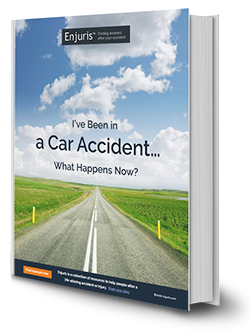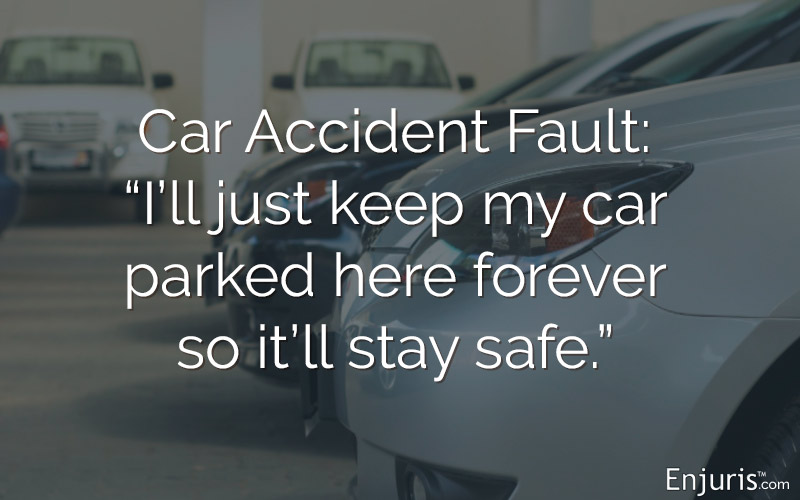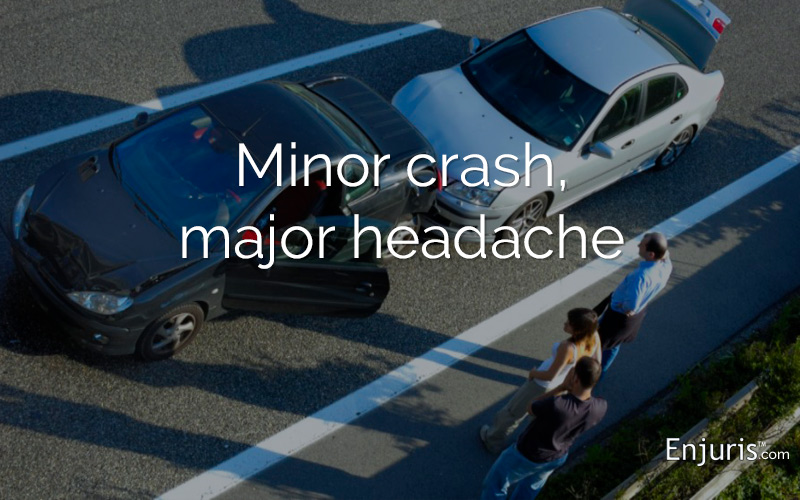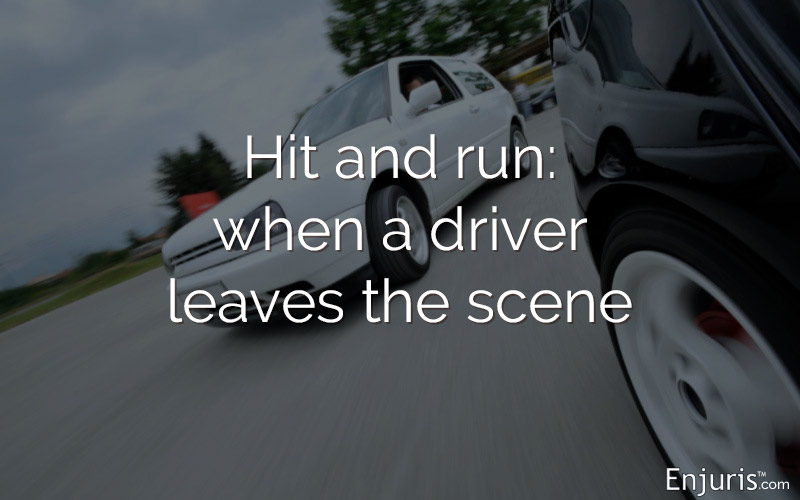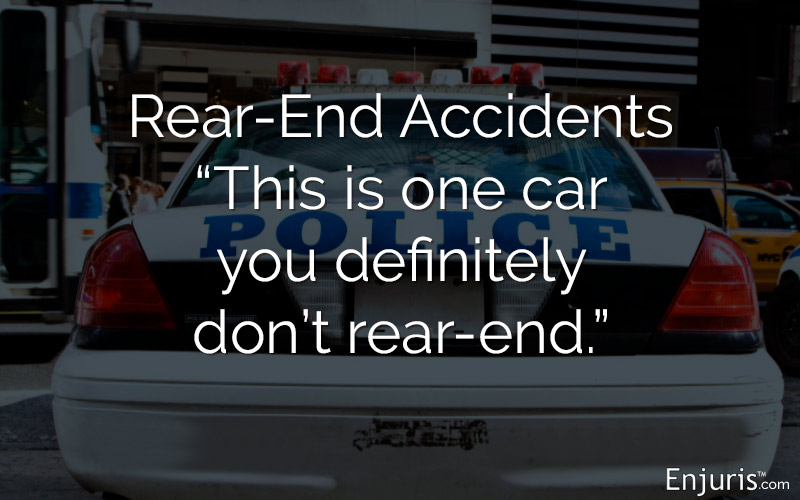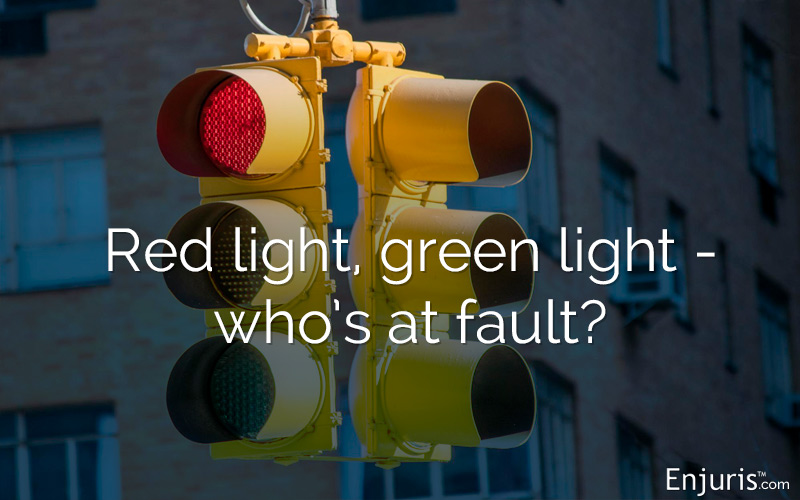North Carolina is one of only 5 states that uses a pure contributory fault system.
This law matters if you're in a car crash, and determining fault will be the key to your recovery.
If you drive, sooner or later you'll probably be involved in some sort of crash, fender bender or collision. It happens to everyone, but minor accidents like fender-benders or a slow-speed rear-end collision are more common than accidents with severe injuries.
Even a minor accident can leave you feeling shaken, nervous, and unsure of what to do next. A serious crash can derail your life completely. In either case, here's how to handle a North Carolina car accident, from the moment it occurs through the legal process to financial recovery.
Basics of personal injury law
First, it's important to understand the basics of personal injury claims. In any civil claim, there's a plaintiff and a defendant. The plaintiff is the person who was injured, and the defendant is the person who the plaintiff believes caused the injury.
The purpose of personal injury law is to make a plaintiff whole. In other words, you can receive financial compensation to recover costs to leave you in the same financial situation as you'd be in if the accident had never happened.
You may only file a claim if an injury costs you money. Most car accidents result in at least some damage to one or both vehicles. You may make a claim for the dollar amount that it costs to repair or replace your car. If you didn't suffer any physical injuries that require treatment, you can't claim anything other than the costs for the vehicle.
Basics of North Carolina's liability laws
Second, North Carolina's fault laws will strongly influence how a car accident claim is handled.
There are only 4 other states that use this method: Alabama, District of Columbia, Maryland, and Virginia. In all other U.S. states, you can recover some damages even if you were partially at fault. The amount would depend on the fault system in that state and what percent you were at fault.
This is important in a car accident claim because there are a variety of situations in which you might not have caused the accident, but the court could find that you might have been able to prevent it had you acted faster or differently.
Here's an example:
You're driving East on Main Street. A drunk driver is approaching from the opposite direction. The drunk driver is traveling 60 miles per hour in a 30 mph speed zone. You approach a traffic light that turns yellow. You slow down but ultimately continue straight through the light because it's not yet red. The other driver abruptly turns left right in front of you and hits the front driver's side quadrant of your car.
The other driver definitely caused the collision, but the court finds that you could have braked sooner or reacted more quickly to avoid the crash and you're therefore 5% liable. In that instance, you wouldn't recover any compensation from the other driver under North Carolina's pure contributory negligence laws.
Unfair? It might seem that way. But right or wrong, it's the way the legal system works in North Carolina.
How to make a car accident claim in North Carolina
North Carolina is an at-fault insurance state.
Some states require all drivers to carry no-fault insurance. In a no-fault state, an injured driver makes a claim against their own insurance policy for personal injuries after an accident and it doesn't matter who was at fault for the collision.
In an at-fault state like North Carolina, however, the injured person must make a claim against the liable driver's insurance policy. In other words, the at-fault person's insurance would pay for the injured person's damages.
You have 3 primary options for receiving compensation after a car accident in North Carolina:
1. File a claim with your own insurer.
You can (and should) call your insurance company immediately after a car accident. If you file a claim, your insurance company will then seek compensation from the at-fault driver's insurance company.
2. File a claim with the other driver's insurer.
You can also go directly to the at-fault driver's insurance yourself. Call the insurance company with the driver's insurance policy number, driver's license number and other relevant information. Then, follow up with written notice that you're intending to file a claim.
3. File a personal injury lawsuit.
This is your last-resort option if you can't get satisfaction from the insurance company. The insurance company will be reluctant to settle a claim if there are questions about who's liable.
The other issue might be that the insurance company isn't willing to provide enough compensation to cover your injuries in their entirety. If you aren't getting what you need for a full financial recovery, you should contact a personal injury lawyer about getting what you deserve.
Proving liability (fault) after a North Carolina car accident
Since North Carolina has such strict fault laws, proving liability might be the most important part of your legal claim after a car accident.
There are several factors that your lawyer will use to prove the defendant's fault:
- Visual evidence. A picture is worth a thousand words, right? If there are photographs of the scene showing how the accident happened or video from nearby surveillance cameras from homes or businesses, red light cameras, or dash cam footage, these images can be powerful evidence. It's hard to argue that something didn't happen the way it's shown on video.It's important to hire a lawyer immediately after your accident so they can conduct discovery to obtain video footage if it exists. Some surveillance and other digital recordings are only saved for a short time, so they will want to obtain it quickly before it's erased.
- Police report. Some people are hesitant to call the police after an accident if they think the damage is minor, but a police report is an important document to have on file. The police approach an accident scene with no preconceived notion of how the accident happened — they'll make a report strictly based on the facts of what they observe at the scene. They'll also include factors that you might not notice like weather conditions, signal irregularities, road conditions, and other pieces of evidence. A police report can help tell the full story about what really happened and insurance companies rely on these documents when evaluating a claim.
- Witnesses. A witness is anyone who observed any part of the accident — the events leading up to a collision, a driver's behavior or demeanor immediately after, road or traffic conditions at the scene, the actions of other drivers, or any other detail that might be relevant to explain how the accident happened. Sometimes there are obvious witnesses like other drivers who stop to help at the scene of the crash. There might be other witnesses too who were inside nearby homes or businesses at the time the accident happened.It's important to take names and contact information for any person present at the scene in case they have relevant information. Even if they don't think what they saw is important, sometimes police officers and lawyers can use parts of witness statements that might not seem obvious as evidence. Often, well-meaning bystanders or other drivers will leave the scene as soon as they see that police or emergency responders have the situation under control. Once they leave, that evidence can be lost if you don't know who they are or how to contact them. If you're in a physical condition to obtain contact information from witnesses at the scene, it's important to do so.
- Medical examination. The amount of your settlement will depend on the extent of your injuries. Even if the accident was minor and you believe you weren't seriously injured, it's crucial to have an immediate medical exam by your primary care provider, an urgent care provider, or a hospital. There are some injuries (like whiplash) that might have symptoms for days — or even weeks — after an accident. If you wait to get a medical exam, it will be more difficult to prove that your injuries are the result of the crash.
North Carolina car accident statutes of limitations
A "statute of limitations" is the legal term for a deadline or time limit.
This deadline is specifically for a personal injury lawsuit. Most insurance companies require claims to be filed promptly after a car accident. That could be days or weeks after the accident; the specific time period depends on the insurer's policies.
If the lawsuit is a wrongful death claim for someone who died in a car accident, the statute of limitations is 2 years from the date of the person's death.
If you don't file your claim within the statute of limitations, the court can refuse to accept your case and you've lost the right to sue for damages.
What to do after a car accident to preserve your legal rights
If you're in a car accident in North Carolina, there are a few ways to protect your right to a claim.
First things first:
Don't try to get out of the car, evaluate the accident, or obtain information unless you're in a condition to do so. If you need to remain in the car and wait for emergency help, that's what you should do. Your safety and physical condition come first.
Following this, here are the steps you should take in the aftermath after a crash:
- Call 911. Your first call should be to emergency responders. Whether the accident is minor or serious, call the police. Tell dispatch whether or not an ambulance is needed, but request that the police respond to the scene either way.
- Move your car out of traffic if possible. Sometimes the position of cars relative to each other helps determine how a crash happened. Before moving your car (or before the other driver moves theirs), take several photos of various angles of the scene in order to preserve evidence. If the cars aren't blocking traffic, leave them where they are after a crash. Only move the car if it's preventing the flow of traffic.
- Obtain information from other drivers. Make sure to get the necessary information from each involved driver. A police report should include most of it, but also you want to have a copy to provide to your lawyer.Try to write down or photograph the following information:
- Driver's name and driver's license number
- Driver's full contact information, including address, phone, and email
- Vehicle registration and insurance information
- License plate number
- Make, model, and color of each car involved in the accident
Post-Accident Journal Form
Sample accident journal/diary to help you document the effect on your daily life
Download in PDF format - Gather evidence. As mentioned above, photos of the scene and obtaining contact information from witnesses can make or break your case. You can never get too much. Not every photo or every witness account will be relevant, but there might be things that your lawyer sees that do matter that you don't realize. Let your lawyer determine what's important and what's not.
- Notify your insurance company. A "report" is not the same as a "claim." Your insurance company likely requires you to report an accident within a certain period of time. But even with your own insurance company, don't say anything that would indicate fault. Stick to basics — when and where the accident took place, and who was involved. Don't give permission for them to record a statement.
When to call a North Carolina car accident lawyer
Since North Carolina laws are strict regarding fault and insurance coverage, it would be best to call a lawyer as soon as possible after your accident. You can easily jeopardize your ability to recover any damages by inadvertently admitting fault (or a portion of fault), and you don't want that to happen. By hiring an attorney right away, you can direct any correspondence with your insurance company or the other driver's insurance company to the lawyer. Your lawyer's job is to protect your interests to the best of their ability.
- How to Handle a North Carolina Car Accident
- How To Get Compensation for a North Carolina Train Accident
- Legal Remedies After a North Carolina Pedestrian Accident
- Motorcycle Laws, Rights, and Responsibilities in North Carolina
- North Carolina Bus Accident Injuries
- North Carolina Car Insurance Laws & Requirements
- North Carolina Distracted Driving Accidents: Laws & Lawsuits
- North Carolina Drunk Driving Laws, Penalties & Victims’ Rights
- North Carolina Hit and Run Laws and Penalties
- What To Do After a North Carolina Bike Accident
- What To Do After a North Carolina Boating Accident Injury
Did you know that car accident law varies by state?
Hurt in a car crash? You may find these resources helpful
Need a lawyer?
What does an injury lawyer do?
A personal injury lawyer helps individuals who have sustained injuries in accidents to recover financial compensation. These funds are often needed to pay for medical treatment, make up for lost wages and provide compensation for injuries suffered. Sometimes a case that seems simple at first may become more complicated. In these cases, consider hiring an experienced personal injury lawyer. Read more
Common car accidents
